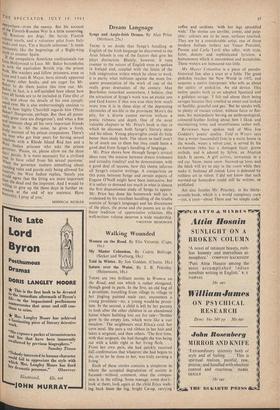Dream Language
Synge and Anglo-Irish Drama. By Alan Price. (Methuen, 25s.) THERE is no doubt that Synge's handling in English of the Irish language he discovered in the Aran Islands is one of the factors that give his plays distinction. Bluntly, however, it runs counter to the nature of English even as spoken in Ireland and, coupled with the limits of the folk imagination within which he chose to work, it is partly what militates against the more fre- quent presentation of the work of one of the really great dramatists of the century. Max Beerbohm remarked somewhere, I believe, that the attraction of Synge's work was an exotic one and God knows if that was true then how much more true it is in these days of the depressing chronicles of sex-life in the provinces. More's the pity, for a drama cannot survive without a poetic richness and depth. One of the most valuable chapters in Mr. Price's book is that in which he discusses both Synge's literary ideas and his idiom. Young playwrights could do little better than study both. The idiom in itself won't be of much use to them but they could learn a good deal from Synge's handling of language.
Mr. Price shows how through Synge's critical ideas runs 'the tension between dream (richness) and actuality (reality)' and he demonstrates, with a good deal of success, how this theme informs all Synge's creative writings. A comparison on this point between Synge and certain aspects of Eugene O'Neill might have been instructive, but it is unfair to demand too much in what is almost the first dispassionate study of Synge to appear. Mr. Price has done his homework well (as is evidenced by his excellent handling of the Gaelic sources of Synge's language) and his discussions of the plays, the prose and the poems are in the finest tradition of appreciative criticism. His well-written volume deserves a wide readership.
VALENTIN IREMONGER


































 Previous page
Previous page